6 clever tech marketing campaigns in 2022
With more tools and channels in the hands of marketers than ever before, modern tech brands are becoming increasingly innovative with their campaigns.
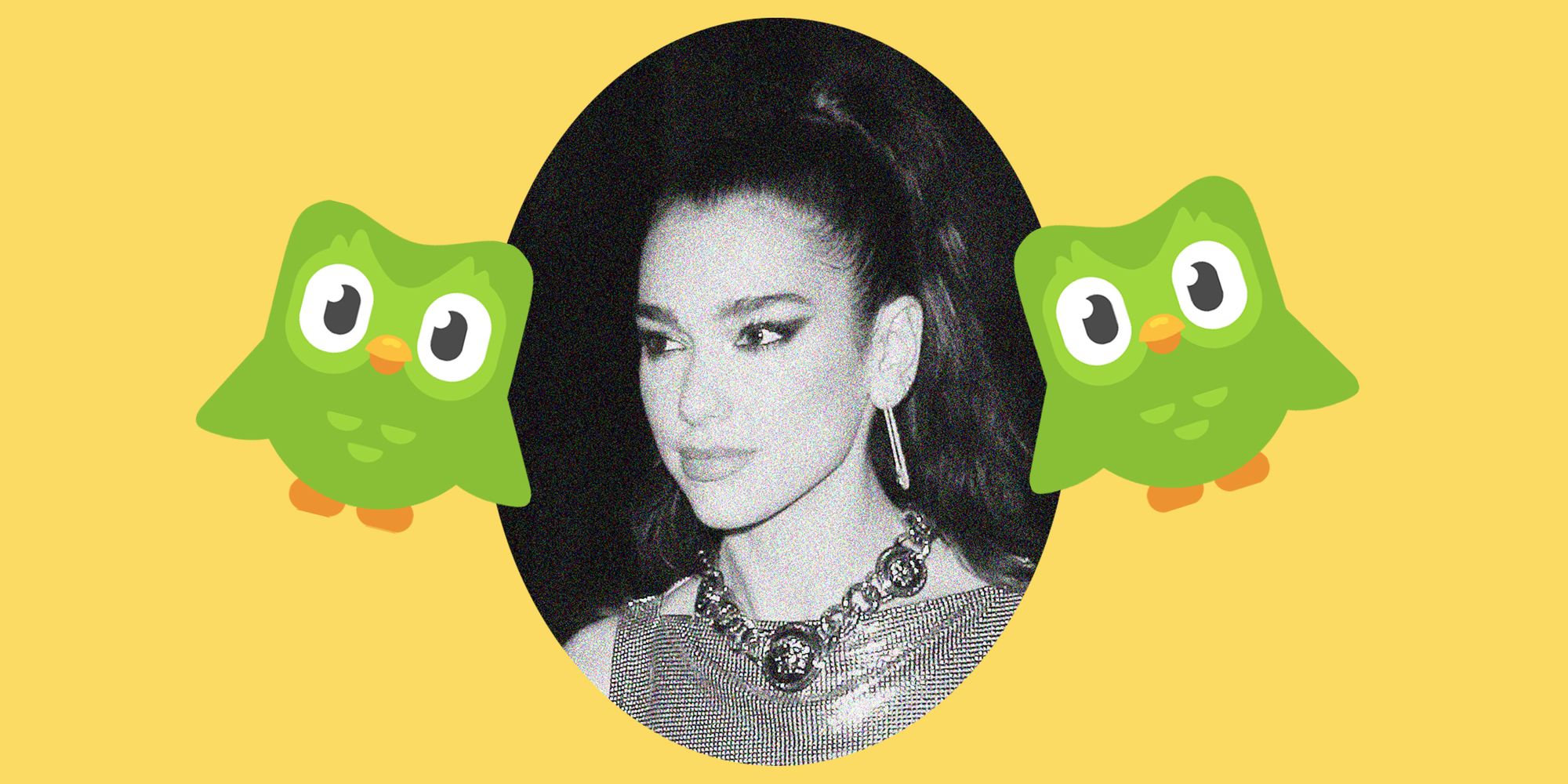
Post-pandemic consumer trends are driving marketers to be bolder and more innovative in their campaign approaches, sparking more in-depth data projects and more audience-centric storytelling.
From social media, mobile marketing, augmented reality, and metaverse to more traditional, offline channels; each one requires a different approach, yet ultimately needs to share the same story.
By observing and studying them, tech marketers can glean important lessons and in turn build their own clever campaigns.
Here are our top six picks of creative tech marketing so far in 2022.
Alexa is a Mind Reader
A study in a 2020 article published in the Journal of Advertising meticulously analyzed 10 years’ worth of Super Bowl advertisements to determine what makes brilliant, “buzzing” campaigns. The answer? Uniqueness and consistency.
Amazon’s mind-blowingly funny 2022 Super Bowl ad starring A-list celebrities Scarlett Johansson and Colin Jost could easily be mistaken for an SNL skit. The Alexa ad, titled “Mind Reader”, goes through a series of unfortunate but hilarious interactions between the couple they play and what could happen if Alexa could truly read their minds.
The ad, which has garnered over 69 million views to date on Youtube, did an excellent job showing Alexa’s voice command capabilities in an edgy comedic way, all while spotlighting its seemingly limitless potential for its users.
Amazon’s dedication to comedic and unique plot consistency in their previous Alexa Super Bowl ads paid off as the ‘Mind Reader’ ad received the most views on YouTube. This amusing ad shows how investing in quality witty ad writing can take you – towards the future.
Samsung’s jabs towards iPhone 14
Nothing’s wrong with a little friendly competition, right? Competition is inherent in business, so it makes sense that some marketing strategies will include comparisons between brands to show which one is superior and increase market growth.
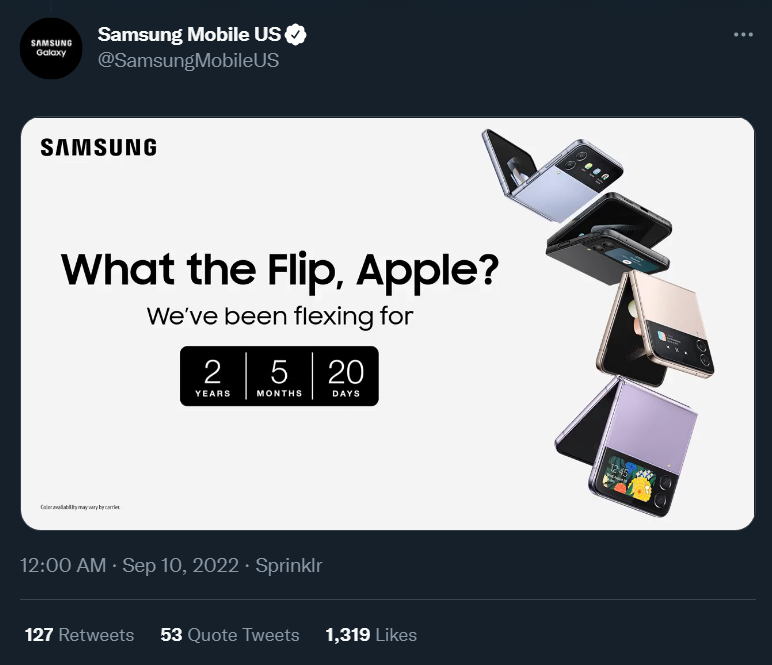
Just a month ago, Samsung tweeted a thread of their reactions to a certain “innovative new” device launched by Apple – which, of course, was the iPhone 14. Samsung’s thread is a series of tweets throwing shade at the new iPhone’s innovations versus their Flip series, casually “flexing” that they are further in the cell phone tech game compared to its rival.
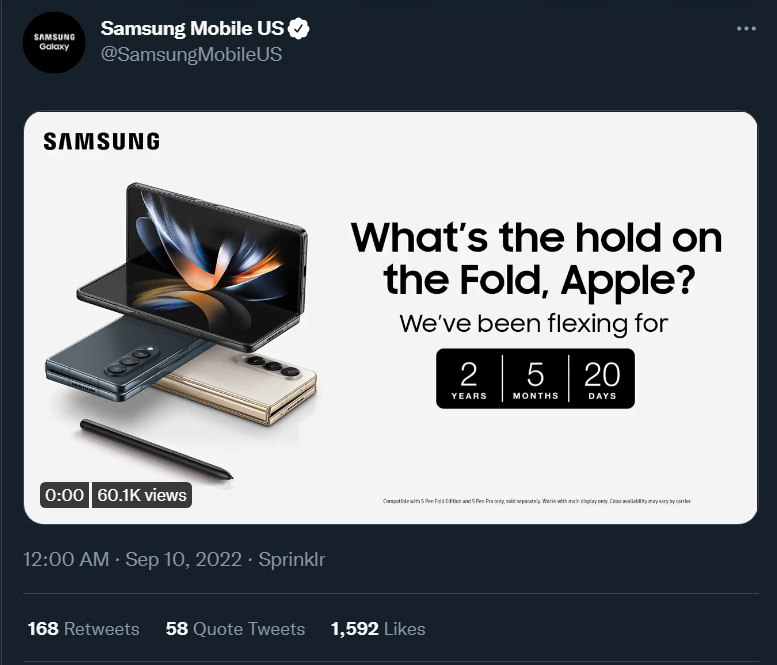
While this further caused a drift between Samsung and Apple users, as seen in the comments section of the thread, it did gain a substantial amount of attention as both are the top two cell phone brands globally, with one of Tiktok’s tech influencers joining in on the banter.
This isn’t the first time that Samsung poked fun at Apple though, and they have always not been subtle about it. This doesn’t stop devoted Apple users from lining up for the iPhone 14, though, but is still a fun way to engage consumers in the Twittersphere.
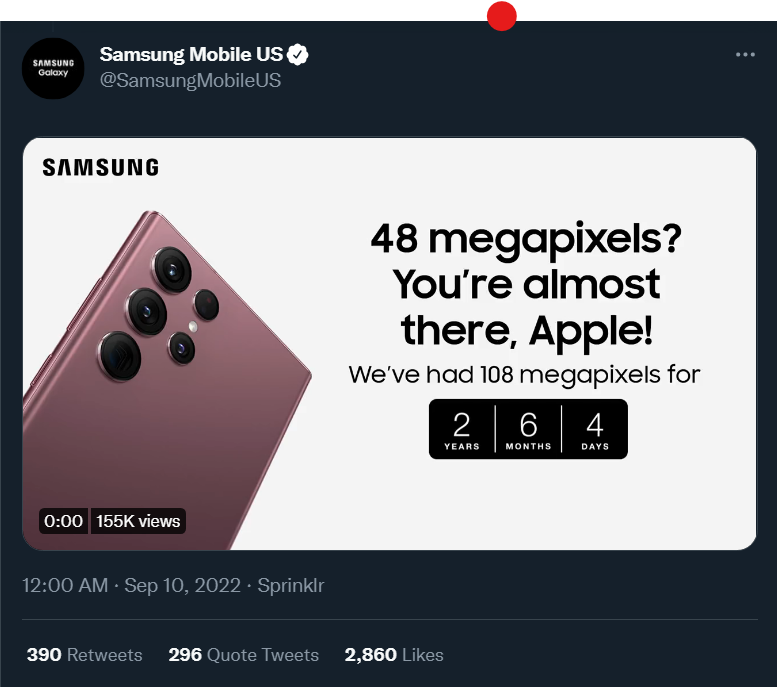
WhatsApp's emotional short film on connections
As humans, we crave for connection, and ads that value empathy often create connections with its consumers through emotional and impactful stories told in its campaigns. Emotional appeal is a great tool for marketers in engaging and connecting with its consumers, rendering a positive impact on their engagement.
Directed by Cannes-winning director Niclas Larsson and Oscar-winning cinematographer, Linus Sandgren, WhatsApp’s New Year’s campaign short film touched its audience’s hearts through a story of lovers separated by distance, waiting for a message as the New Year arrives.
Titled “It’s not the New Year until you get the message you’ve been waiting for”, the almost 4-minute short film takes the audience on a whirlwind journey of love between the two sullen lovers, who perk up the minute a meaningful New Year’s message arrives through – you guessed it, WhatsApp.
To show that an app can be a bridge to human connections brings impact to how WhatsApp’s users can utilize it, and that at the end of the day, showing authenticity and vulnerability brings your consumer audience closer to your brand.
Reddit's 5-second Super Bowl ad
A study from the University of Minnesota Carlson School shows that Super Bowl ads impact word-of-mouth marketing, and advertisers should expect to see effects such as a 16% increase in total word-of-mouth the month of the game and a 22% word-of-mouth increase the week after.
But, naturally, Super Bowl ads are exhorbitantly expensive. It's estimated that 30-second ad slots were selling pretty quickly this year for around US$6.5 million (the most costly in NFL history).
During the game in February, one of the most interesting ads came from Reddit. Historically, brands tend to book Super Bowl slots of 15 to 30 seconds, but Reddit decided to take a bold approach with its 5-second video campaign.
The ad started with a generic car promo, but then cut to a glitch with a message from Reddit on the screen, displaying some text momentarily before shifting to horses galloping through a field. It was confusing, to say the least, so some viewers thought it must have been a mistake.
Despite the limited air time, viewers flocked to social media to find out exactly what had just happened. Thus, the brand's goal was achieved. A tweet from Reddit was waiting for them, and it quickly racked up 464,000 views. Additionally, The New York Times named it as the most memorable and attention-grabbing ad of the day.
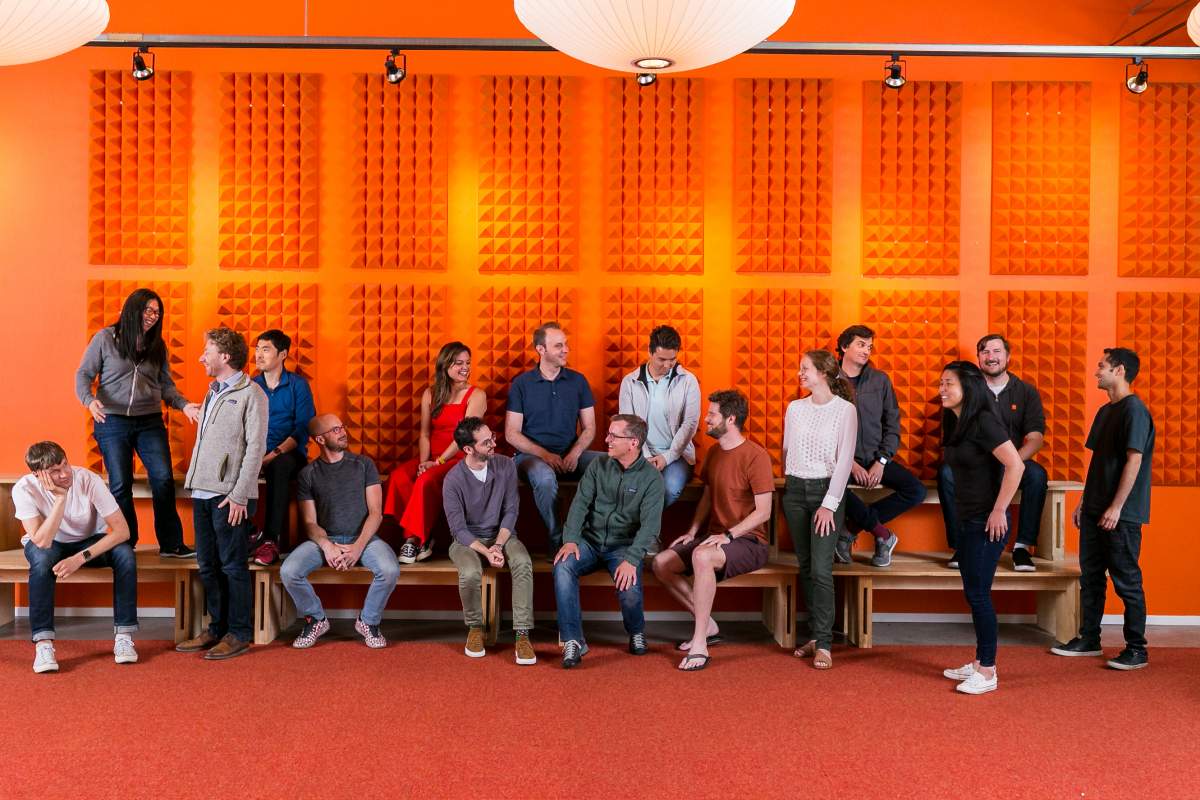
Facebook's rebrand
Facebook made a jarring announcement when it changed its name to Meta. But the rebrand was more than a simple name change. The company has branded itself entirely around the popular concept of the 'metaverse,' a virtual reality phenomenon that has become a hot topic of discussion these days.
The timing was well-planned, as the metaverse became a popular theme at the Consumer Electronic Show (CES) 2022, highlighting Meta as the most notable brand in the space.
CES is ground zero for new gadgets and tech innovations that aim change the way customers interact with each other. For this reason, CES offers a big opportunity for brands to promote themselves and their visions.
With more than 25,000 advertising and marketing professionals attending CES, this year's event had no less than three-panel discussions about the metaverse, and now all attendees (on-site and off-site) surely think of Meta when they hear the term "metaverse."
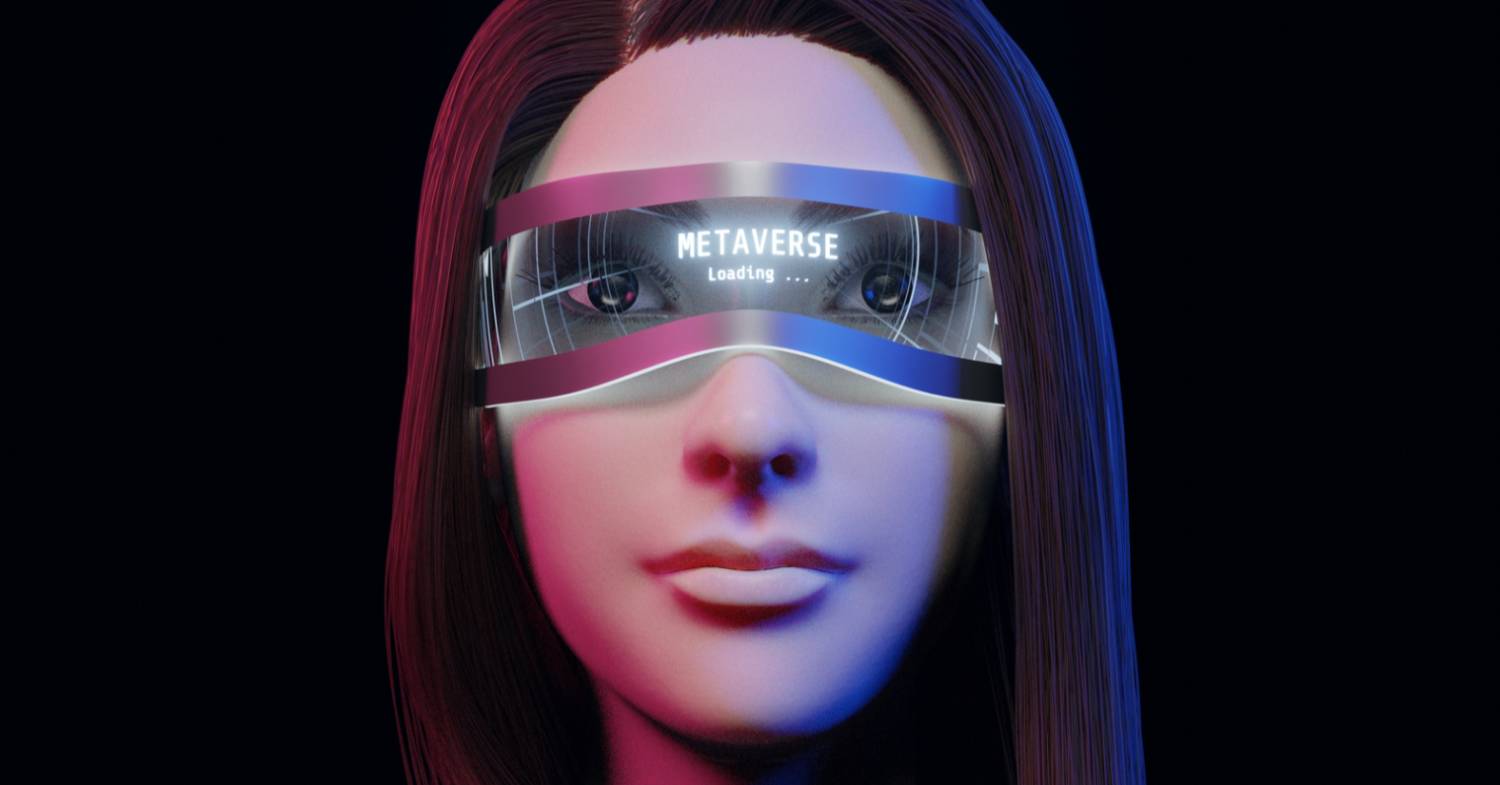
Duolingo's Tiktok strategy
Sometimes, a successful content marketing play doesn't need to overtly promote a product. In some cases, it's more effective to simply spark an interest in the brand.
Duolingo's Tiktok social media strategy is quite simple, sharing how its green owl mascot is obsessed with famous pop artist Dua Lipa. The content mainly focuses on Duo the owl practicing pick-up lines for Dua Lipa, going as far as holding hands with a lifesize cut out of her, and flying to New York with an engagement ring balloon, only to be comically rejected.
The result was enormous, as Duolingo's TikTok had 2.9 million followers by February 2022, growing massively from just 50,000 followers in September 2021.
Duolingo's TikTok strategy is designed to simply entertain its target audience with comedy skits rather than explicitly selling the app.
This is precisely the kind of content TikTok users want, as research shows that humor and creativity are valued most on TikTok, with 63% of users saying they want 'funny' content on the app.



